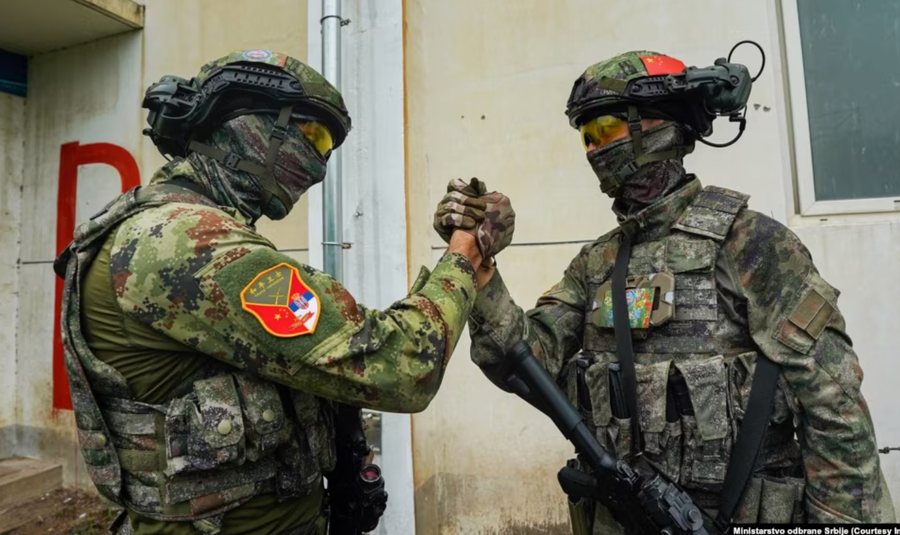
The ten-day exercise of special forces units of the Serbian and Chinese armies was held in Hebei province in northern China, despite warnings that Brussels had made to Belgrade.
Following last year's maneuvers with the Belarusian army – on NATO's border in Europe – this year, Chinese soldiers conducted exercises with the Serbian army.
This was the first time that China and Serbia, a candidate country for membership in the European Union and a close ally of China and Russia, held joint military exercises.
Professor at Johns Hopkins University in the US, Daniel Serwer, praised this development for Radio Free Europe as further confirmation that "Serbia is getting closer and closer to Beijing, as well as to Moscow."
"Those who said that President Vučić would embrace the West were wrong," said Serwer.
Although EU integration is Serbia's strategic goal, it - under the leadership of President Aleksandar Vučić - is deepening relations with China. The two countries call their relationship a "steel friendship" and a "strategic partnership."
Serbia's Defense Ministry praised the exercises as having given "impulse to strengthening military cooperation" with China - making Serbia the only EU candidate country to train with the Chinese military.
Serbia is militarily neutral, but is part of NATO's "Partnership for Peace" program and cooperates with the alliance in this framework.
The joint exercises, dubbed “Peacekeeper 2025,” focused on the use of drones, as Serbia purchased Chinese combat drones and the FK-3 anti-aircraft system. This made Serbia the first country in Europe to operate the Chinese equipment — a development that has raised concerns in Brussels and Washington.
Serbia's Ministry of Defense did not respond to Radio Free Europe's question about why the exercises were conducted despite the EU warning.
When the exercises were announced in mid-July, an EU spokesperson told Radio Free Europe that “Serbia should refrain from actions and statements that contradict EU foreign policy positions.”
Asked how long Serbia can continue cooperation with China, Professor Serwer said: "As long as it wants - if it is not serious about EU membership."
As of December 2021, Serbia has not opened any new chapters in EU membership negotiations – among other things because it has not joined the sanctions against Russia, following its invasion of Ukraine.
The deepening of relations between China and Russia, following the invasion of Ukraine in 2022, is one of the main issues of conflict between the EU and China.
The EU-China summit held on July 24 in Beijing also highlighted deep political differences, with Chinese President Xi Jinping declaring that "the challenges facing Europe do not come from China."
Professor Serwer says that "Serbia is clearly signaling that it is not, and will not, be aligned with EU foreign policy."
"It also implies that China's ambition to reclaim Taiwan has a parallel with Serbia's ambition to reclaim Kosovo," he adds.
Serbia counts on the support of China and Russia in international organizations to oppose Kosovo's independence, while on the other hand, Belgrade supports the "one China" policy and does not recognize Taiwan's independence.
Belgrade's closeness to Beijing
The joint military exercises "crowned" the military cooperation between Serbia and China, which had begun in 2020 with Serbia's purchase of six new CH-92A drones.
Two years later, Serbia also purchased the Chinese FK-3 anti-aircraft system.
Subsequently, Serbia also purchased a new Chinese CH-95 drone, but it has not been officially announced how many units of this type have been purchased.
NATO and the US State Department did not respond to Radio Free Europe's questions regarding the joint military exercises between Serbia and China, until the publication of this report.
Asked how Washington might react, Professor Daniel Serwer – former State Department special envoy for Bosnia and Herzegovina in the 1990s – said:
"I don't think the US will take any major action."
"They have a lot of problems in other countries. But that won't make Vucic's visit to Florida any more productive than last time," he said.
Serbian President Aleksandar Vučić, during a visit to the US in early May, did not meet with US President Donald Trump, although he had announced that he would meet him twice.
He cut short his visit to Florida and returned to Belgrade, due to – as he said – health problems with high blood pressure.
The United States had previously warned Serbia about purchasing Chinese weapons.
"Governments must be aware of the short-term and long-term risks, as well as the price of cooperating with Chinese companies," the US Embassy told Radio Free Europe in August 2020.
There is currently no information whether a joint military exercise will also be held on the territory of Serbia.
On European soil, a joint exercise was held in July 2019 – before the Russian invasion of Ukraine – in Germany, where the military-medical exercise "Joint Assistance 2019" was organized between China and Germany, with a focus on preparing for response in cases of humanitarian crises.
Xi Jinping's letter to Vučić
On the same day that the news of the joint military exercises was published, Chinese President Xi Jinping sent a letter to Serbian President Aleksandar Vučić in response to the latter's birthday greetings.
In his letter, Xi highly praised Serbia's unwavering and continuous support for China on issues that, as he put it, relate to "core interests and major concerns" for China.
Commenting on Chinese interests, American professor Daniel Serwer said that Beijing is interested in strengthening Serbia's role as a useful entry point to Europe.
"Also, for profitable projects in Serbia, such as the railway," he added.
Chinese companies are involved in many infrastructure projects in Serbia, which have usually been awarded without regular tendering procedures.
Meanwhile, China has become Serbia's largest trading partner for imports. In 2024 alone, imports from China reached a value of 5.13 billion euros.
In addition to political support, the authorities in Belgrade also rely on China for economic investments and financial loans. /REL (A2 Televizion)











